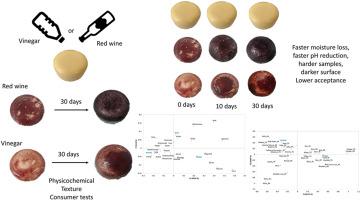探索殖民地奶酪在葡萄酒和醋中的腌制成熟过程:理化特性、感官属性和唤起的情感
IF 3.2
2区 农林科学
Q2 FOOD SCIENCE & TECHNOLOGY
International Journal of Gastronomy and Food Science
Pub Date : 2024-11-19
DOI:10.1016/j.ijgfs.2024.101066
引用次数: 0
摘要
在巴西南部,殖民奶酪是一种非常受欢迎的传统乳制品,在经济和文化方面发挥着重要作用。传统食品的创新对于市场的持续增长至关重要。用葡萄酒腌制奶酪是一种众所周知的做法,但在巴西南部,使用醋也是一种非正式的传统做法,但很少有人对其进行研究。这项研究旨在评估殖民地奶酪在成熟期用葡萄酒和醋腌制的影响。将殖民地奶酪浸泡在葡萄酒或醋中,并腌制 30 天。在成熟期对奶酪的颜色、水分、质地和 pH 值进行评估,并对 30 天成熟期结束后的奶酪进行接受度、属性感知和诱发情绪分析。此外,还探讨了购买奶酪的驱动因素。浸泡在醋中的奶酪水分流失更多,pH 值下降。浸入葡萄酒中的奶酪表面在浸入葡萄酒后立即呈现出深红色,并在成熟的第十天前逐渐变深。浸泡在醋中的奶酪表面颜色较浅(红色和深色)。硬度在成熟过程中逐渐增加,腌制过的样品硬度更高。对照组奶酪的接受度更高,并能唤起积极情绪,而实验组奶酪则能唤起更多的消极情绪。用葡萄酒和醋腌制的奶酪融入了所用饮料的特有香气和风味。享乐方面和新口味的出现是购买奶酪的主要驱动力。因此,将奶酪浸泡在葡萄酒或醋中会影响奶酪的成熟过程,对产品的物理化学和感官特征产生不同的影响。本文章由计算机程序翻译,如有差异,请以英文原文为准。

Exploring the marination of colonial cheese into wine and vinegar through ripening: Physicochemical characteristics, sensorial attributes and emotions evoked
In southern Brazil, colonial cheese is a very popular traditional dairy and plays significant economic and cultural roles. Innovation in traditional foods is crucial for continued market growth. Marinating cheeses in wine is a known practice, however the use of vinegar is traditional on informal scale in southern Brazil, but little explored. This study aimed to evaluate the impact of marinating colonial cheese in wine and vinegar during ripening. Colonial cheeses were immersed whether wine or vinegar and ripped for 30 days. Colour, moisture, texture and pH parameters were evaluated during the ripening period and cheeses in the end of 30-day maturation were subjected to acceptance, perception of attributes and evoked emotions analyses. Drivers of purchasing were also explored. Cheeses immersed in vinegar showed a greater loss of moisture and a decrease in pH. The surface of cheeses immersed in wine showed a dark and reddish color immediately after immersion in wine, with gradual darkening until the tenth day of ripening. Immersion of the product into vinegar implied on cheeses with surface with a less intense coloration (red and dark). Hardness increased through ripening and were higher on marinated samples. The control cheeses showed greater acceptance and evoked positive emotions, while the experimental cheeses evoked more negative emotions. Cheeses marinated in wine and vinegar incorporated characteristic aroma and flavors of the beverage used. Hedonic aspects and the presence of new flavors were the main drivers of purchasing the cheeses. Thus, immersing cheese in wine or vinegar impacts the maturation process, providing different effects on physicochemical and sensorial features of the product.
求助全文
通过发布文献求助,成功后即可免费获取论文全文。
去求助
来源期刊

International Journal of Gastronomy and Food Science
Social Sciences-Cultural Studies
CiteScore
5.30
自引率
10.50%
发文量
170
审稿时长
45 days
期刊介绍:
International Journal of Gastronomy and Food Science is a peer-reviewed journal that explicitly focuses on the interface of food science and gastronomy. Articles focusing only on food science will not be considered. This journal equally encourages both scientists and chefs to publish original scientific papers, review articles and original culinary works. We seek articles with clear evidence of this interaction. From a scientific perspective, this publication aims to become the home for research from the whole community of food science and gastronomy.
IJGFS explores all aspects related to the growing field of the interaction of gastronomy and food science, in areas such as food chemistry, food technology and culinary techniques, food microbiology, genetics, sensory science, neuroscience, psychology, culinary concepts, culinary trends, and gastronomic experience (all the elements that contribute to the appreciation and enjoyment of the meal. Also relevant is research on science-based educational programs in gastronomy, anthropology, gastronomic history and food sociology. All these areas of knowledge are crucial to gastronomy, as they contribute to a better understanding of this broad term and its practical implications for science and society.
 求助内容:
求助内容: 应助结果提醒方式:
应助结果提醒方式:


